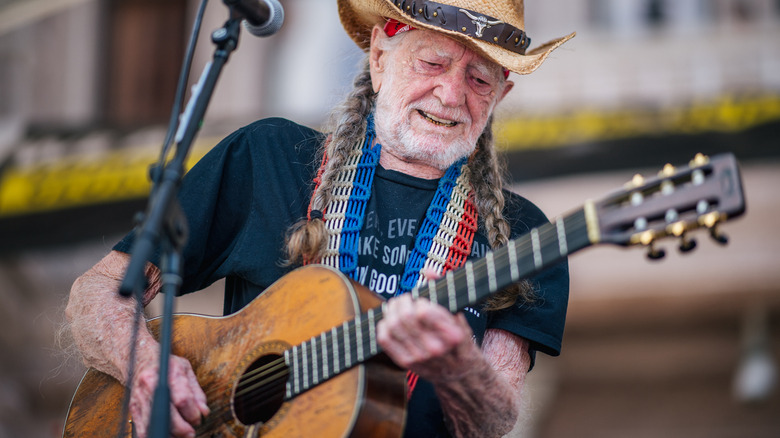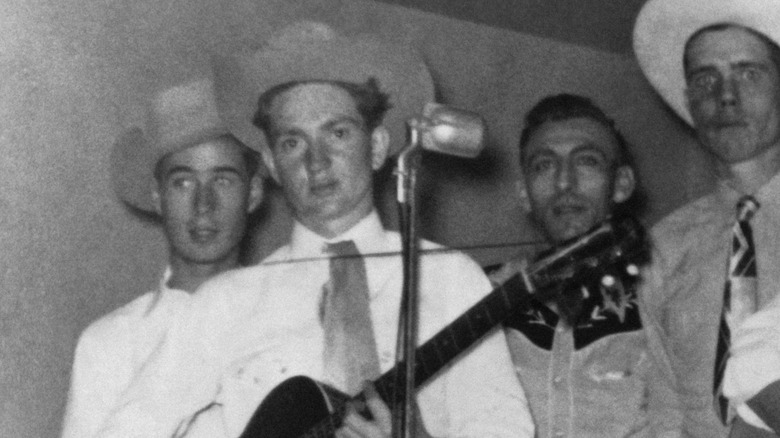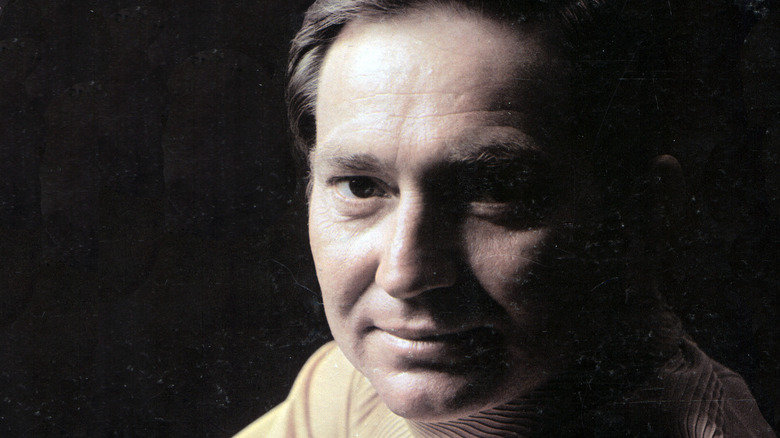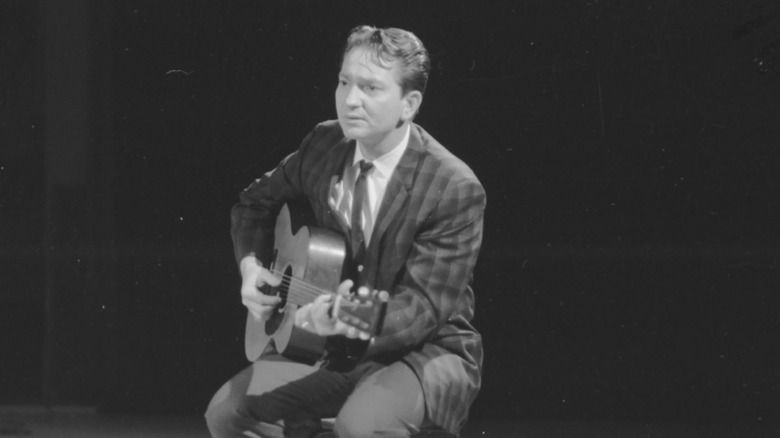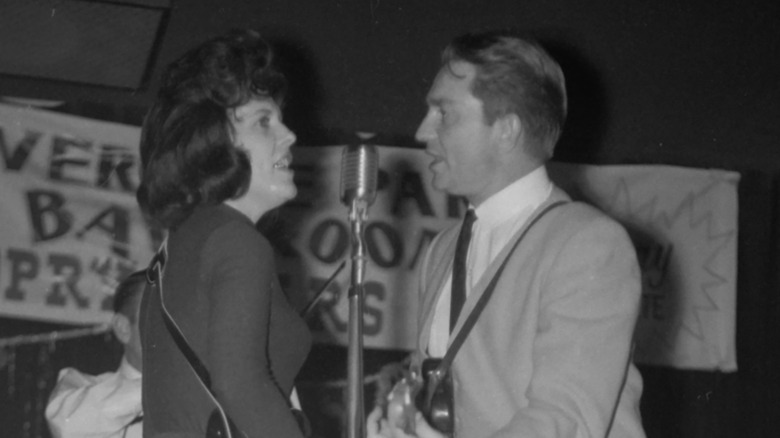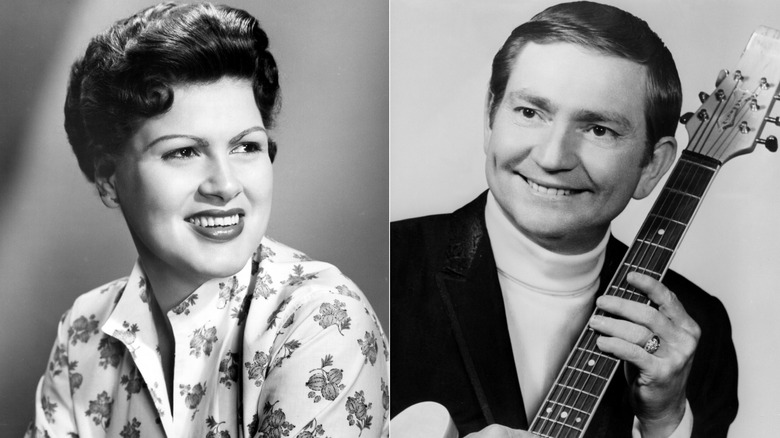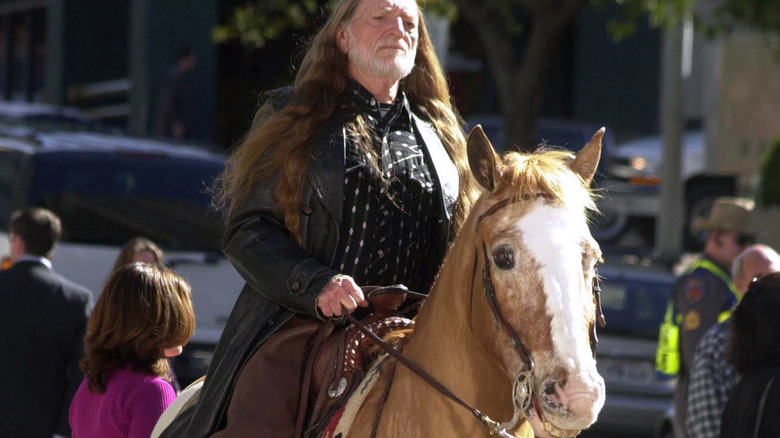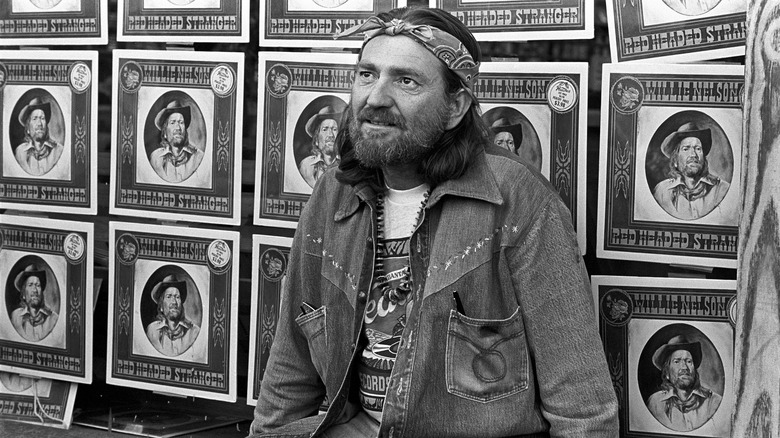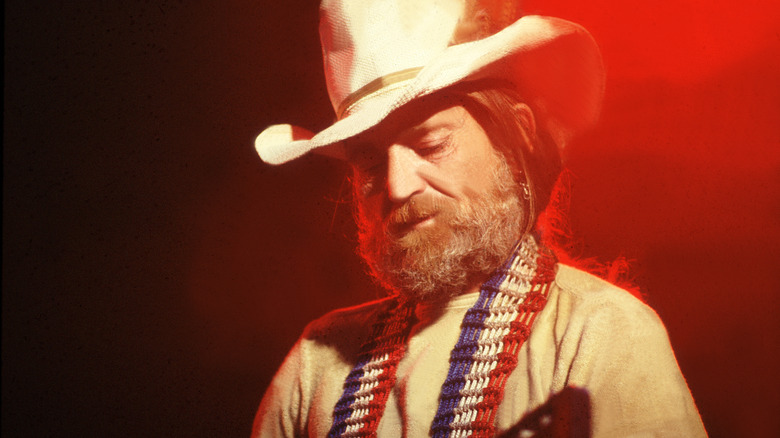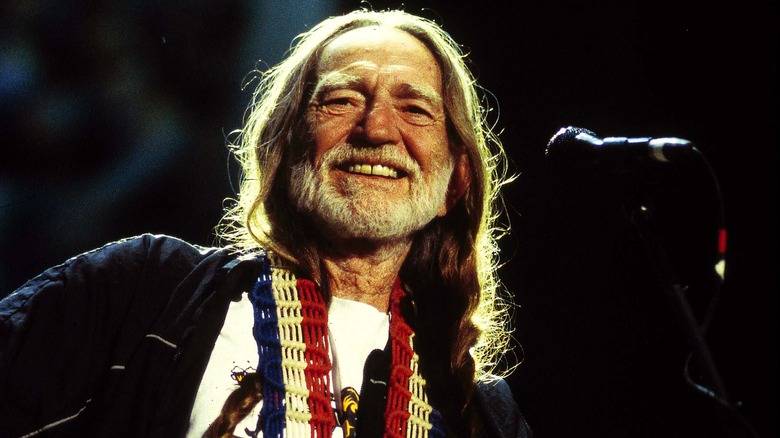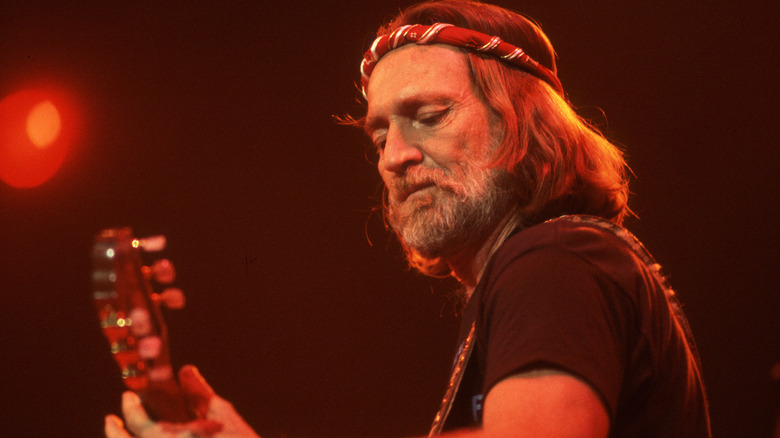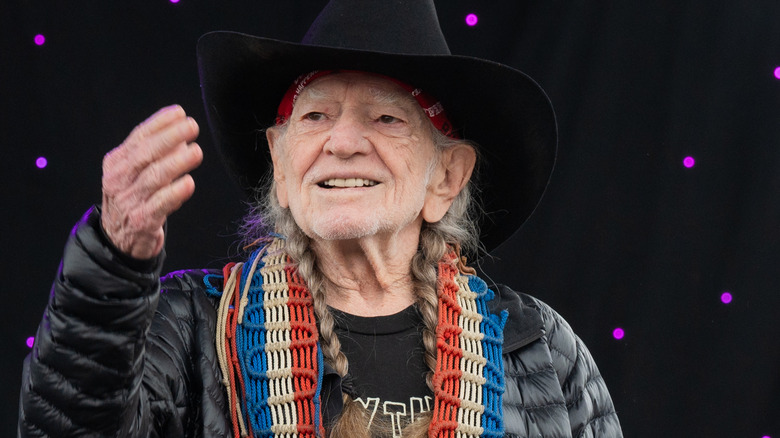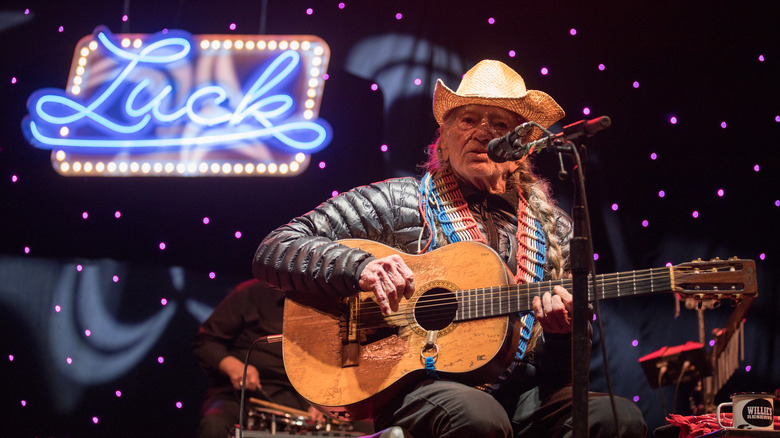Willie Nelson: 12 Facts Only His Biggest Fans Would Know
Willie Nelson is the stuff of road trips and backyard barbecues, served under the long, hot, summer afternoon sun. It's safe to say that he's as American as American gets, and he's not likely to let anyone forget it, either. Especially with the stories he had to tell — and it turns out that there are some things he's holding back.
It wasn't until the 2020 documentary "Jimmy Carter: Rock & Roll President" (via KIRO7) that the truth about an old story came out — and it was, as they say, a doozy. The old story about Willie Nelson smoking a joint on the roof of the White House? It was true that he'd been up there to partake, but the part about him doing it with a member of the president's staff? That wasn't precisely accurate: He had actually been smoking with the president's son, Chip Carter.
That's the kind of quality Willie Nelson that fans are there for, and honestly, it's just the tip of the iceberg. From his heartbreakingly difficult childhood to his briefly-held belief that he had actually discovered The Beatles, Nelson's life has been one wild ride.
His difficult childhood got more difficult with the death of his grandfather
Everyone has to learn about grief and loss sometime, and for Willie Nelson, that came early on in life. But first, a little background: In his book "Roll Me Up and Smoke Me When I Die: Musings From the Road," he wrote that his parents divorced when he was six months old. He went to live with his grandparents, but unfortunately, his time with his grandfather was short-lived.
Nelson remembered his grandfather as a powerful figure, a blacksmith with a booming voice. He was only 56 years old when, in 1939, he came down with pneumonia and passed away after a week-long illness. In his memoir, "It's a Long Story: My Life," Nelson wrote, "I was devastated the way any six-year-old boy losing the most important man in his life would be devastated. This was my first encounter with death, and the encounter could not have been closer."
His grandmother rallied, and after briefly seeing their parents again at the funeral, Nelson and his sister, Bobbie, knew that they were going to be still in loving hands with their grandmother. Life, though, was hard — they found themselves living in a place where they pasted newspapers to the walls for a little more precious warmth. Still, Nelson said that he'd already been given the most precious gift of all: A guitar, several months before his grandfather's illness and death, and lessons from the man he called Daddy Nelson.
Here's how he got his strange nickname
Everyone has those nicknames that they just sort of wish would get left in childhood, and Willie Nelson fans may have heard him called "Booger Red." Why? Is it a reference to his hair color? Something else? According to his memoir, "It's a Long Story," it definitely falls into the category of "something else."
Nelson recounted how his grandparents insisted he and his sister learn to be comfortable speaking in front of groups, and their go-to was having them speak in front of church gatherings. He told the story of one day when he was tasked with reading a poem at a church picnic, dressed in a little white sailor suit. If it seems like a bad idea to put a five-year-old in all-white clothing, well, it was.
"Just before I was set to go on, I started picking my nose," he wrote. "I was nervous and didn't realize how deeply I had dug into my skin. When I hit the stage, red blood was pouring all over my white suit." Nelson said that he ditched the poem that he was supposed to read and improvised a new one — telling people that if they didn't like the way he looked, they could look away — and added, "That's how I got the nickname Booger Red."
He thought he discovered The Beatles
Before he was on-stage, Willie Nelson worked a number of odd jobs. That included working mornings at a radio station called KBOP, which he fully admitted to lying his way into. Part of his responsibilities included signing on in the morning — when he was often hungover — but he also did his own live show in a half-hour slot every day. It was there that he met Johnny Bush, and from that meeting, they formed a group and played together in a series of shows at a local ballroom.
Like all bands, they did their share of covers. In his book, "Roll Me Up and Smoke Me When I Die," Nelson recalled one particular song that was a massive hit with the crowd: "Yesterday," which is pretty famously by The Beatles. He wrote: "I thought that I had discovered an obscure song that no one had heard of before, not realizing The Beatles had just sold ninety zillion records."
He had a similar experience with Julio Iglesias, too: He was on tour in England when he heard this apparent newbie — at least, as far as he was concerned — and became dead set on recording with "whoever it was that I thought I had discovered. I found out later that he too had already sold ninety zillion records — but in seven different languages."
The extreme way he changed his negative thinking
Willie Nelson has been candid about his early struggles, and in his book "The Tao of Willie: A Guide to Happiness in Your Heart," he wrote about the difficulties that filled his early years and made him angry, rebellious, and self-destructive. By the time he'd gotten sick of trying and failing in Nashville, he'd already put a handful of failed relationships — and marriages — under his belt, and had built up a reputation for fighting.
He wrote, "One night I got so down on myself that I lay down in the middle of the street in front of Tootsie's Orchid Lounge in Nashville and waited for a car to come by and run me over. ... When no cars came along for quite a while, it occurred to me that there was no one to blame for this sorry situation other than myself. ... I also realized that eventually it'd all turn out okay."
Nelson said that he'd spent so much time imagining his life going bad that it had become a sort of self-fulfilling prophecy, and while it might not be advised to lay in the middle of the road to come to that realization, he says that it went a long way to turning his life around. He wrote, "It took me a long time to realize that I didn't have to make life so danged hard."
No one actually knows how he got together with Patsy Cline
It's arguable that Willie Nelson has had an even bigger impact as a songwriter than as a singer, and he's penned countless songs, including Patsy Cline's hit "Crazy." It's a great song — seriously, go listen to it — but hilariously, he's told multiple stories about how it all came together. Cline was recuperating from a devastating car accident when Nelson approached her... or, didn't approach her at all, as it were.
In one version, Nelson pitched the song to Cline's husband/manager, Charlie Dick. They were at a bar, it was 1 a.m., and Dick was so taken with the song that he wanted to waste no time in getting it in front of his wife, but Nelson didn't want to intrude at the unreasonable hour. Dick, however, insisted — and the rest is history.
Maybe. Nelson has also told a completely different version of the story, one that paints Dick as being such a massive fan of his that he played one song pretty constantly. Knowing Cline was sick and tired of hearing from him, he opted to stay in the car until she insisted that he come out. Is that the truth? Who knows! Biography adds, though, that although Cline initially struggled with the song, she stepped away for a few days and then returned to the studio: That final version was the result of one take.
He doesn't just love horses...
There's no aspect of horse slaughter that's not horrific: The Humane Society says that 166,000 horses were sent to slaughter in 2012 (a number that's since decreased significantly), and the USDA says that just over 92% of those horses are healthy and could have lived long lives. Horrified? Willie Nelson is, too.
In 2019, KSAT talked to him about the free-roaming residents of his 700-acre ranch. The more than 70 horses were rescued in the 11th hour, just before they were shipped off to slaughter. Nelson was probably right when he described them: "My horses are probably the luckiest horses in the world."
Horses aren't the only animals that he's kept on a massive scale, and in his book, "Roll Me Up and Smoke Me When I Die," he wrote about taking some time off from touring to focus on songwriting... and raise hogs on the side. He shared that he'd been doing it since he was in high school, and that made it even more surprising that this time, he built the fence with a little too much of a gap. As soon as the baby hogs ran off the truck, they just kept right on running: "By the time we got them back in the pen, they were almost too big to crawl out again," he recalled. The ending of the story wasn't much better: Without room to exercise, "they were rupturing..." and he sold them at a loss.
He suggests his Cherokee heritage is why pot agrees with him
Willie Nelson and pot go together like peanut butter and jelly, and he says that there's a good reason for that: genetics. In his book, "The Tao of Willie," he talks about how it's the best stress relief out there, and says that there's more to it than just feeling good. In all his years, he's learned that other substances — like alcohol — do the opposite of chill him out. Marijuana, however, is chill as chill can be, and he wrote: "I suspect it has something to do with my Cherokee heritage."
Explaining Cherokee beliefs that teach a connection to nature is a connection to happiness and contentment, he also explained that for generations, medicine came in the form of the plants, flowers, seeds, and herbs that grew across the country. The farther away humankind gets from that connection and that ancient medicine, the worse off they are mentally, physically, and emotionally.
He also took it one step further, saying that the laws against marijuana and possession were ridiculous, considering it was something that grew wild across a large portion of the country. He added: "The bottom line is that I'll support a war on drugs, but not a war on flowers and herbs. It's as simple as that — as simple as me asking what gives anyone the right to say that God was wrong to put them here."
Shotgun Willie, gun control, and shooting himself
Willie Nelson told the story of his "Shotgun Willie" nickname (via Texas Hill Country), and it started when Nelson found out that his daughter had been the victim of domestic violence. "I ran for my truck and drove to the place where Steve and Lana lived and slapped Steve around," he recounted.
Nelson returned home, and the aforementioned son-in-law followed him... with a .22 rifle. Not about to stand for that sort of thing — especially when a bullet narrowly missed him — he ran back out and took a few shots with his M-1. Not a shotgun? No, but when he staked out his house from his truck that night and his son-in-law returned, he had a shotgun with him that time — and used it to shoot out the car's tire. That's when the police got involved, and Nelson said that his son-in-law "must have run over the bullet."
Surprisingly, Nelson — who told the parents of Uvalde shooting victims (via Yahoo!), "Remember that it's not something you get over, but it's something you will get through" — has a strict stance on gun control. In his book, "Roll Me Up and Smoke Me When I Die," he wrote about playing with stick guns as a child, getting his first real gun at 12 years old, and almost shooting himself in the leg. His thoughts on assault weapons? "Anyone with loved ones knows those should be outlawed. ... A handgun, a shotgun, and a deer rifle are all we really need. Period. End of story."
He's developed a fascinating take on religion
In his memoir, "It's a Long Story," Willie Nelson wrote that he found his secular and religious life came into direct conflict when he was teaching Sunday school for his Metropolitan Baptist Church. Regardless of anyone's personal belief system, it's entirely possible everyone can agree that Nelson would be the objectively best Sunday school teacher ever... but he was still pulled aside and told that since he played in bars on Saturday, it wasn't appropriate for him to be teaching on Sunday.
Nelson started reading various books on faith and came to a fascinating conclusion: Reincarnation, he decided, went hand-in-hand with the basics of Christianity. "I was drawn to the idea that you keep coming back till you get it right," he wrote. Sure, Christ had one lifetime, "But the rest of us would need several lifetimes to shed our sins and learn the lessons necessary to heal our troubled souls."
Pretty deep, right? Nelson also has written about subscribing to some of the theories of Edgar Cayce, the turn-of-the-century faith healer, psychic, and prophet. In "The Tao of Willie," he wrote about Cayce's teachings that described Earth as sort of like a library, and people being kind of like the books. "...every person on the earth carries the record of that history in their genes, their blood, and their bones. And that made sense to me," he wrote.
Who does he consider the best of the best?
Fans of Willie Nelson can take their pick of reasons to look up to him, but whatever it is, it's fascinating to find out who he looks up to. Fortunately, he wrote about them in his book, "Roll Me Up and Smoke Me When I Die."
As far as the best guitar player, he gave a shout-out to Django Reinhardt. He recalled being told that he "played 'like Django with one finger,'" and added, "That's about the nicest thing anyone has ever said about my playing, because as we all know Django... was still the best guitar player that ever lived." And as far as Nelson's opinion on the best country singer, he wrote that was, hands-down, Ray Price. He had first-hand experience there, too, as he played bass for Price after he lost his regular bass player to Johnny Paycheck. Anyone saying that Nelson doesn't play bass would be correct, and in his book, he thanked Price for keeping him around anyway.
But when it came to all-around entertainer, Nelson name-dropped someone else, writing, "The greatest musician, singer, writer, and entertainer that I have ever seen or heard is Leon Russell." He recalled playing with him in New Mexico, and spending hours hanging out before going on stage and experiencing the surrealness of bringing thousands of people to their feet. "The magic was the music," he wrote. "It touched all kinds of people, and the world has not been the same since."
His philosophy for seeing 90
Willie Nelson turned 90 in 2023 and celebrated in style with a massive party that brought some of music's biggest names together. (Best of all, the world learned that hilariously, Nelson has the honor of being the only person to offer Sheryl Crow's father a joint.) Hitting 90 is impressive, and as for the party, Nelson told Parade that it wasn't his idea. He said, in fact, "It's kinda gotten out of hand. I don't know how many people are coming at this point. I just hope I get to sing something with all of them."
Nelson said that he has no plans on slowing down, either — he made it clear that he was going to keep performing and recording as long as people kept listening. Given the turnout for his party, it's safe to say that's never going to end.
When someone hits a certain age, everyone else wants to know what the secret is. Nelson has shared his, and it's the sort of thing that's both straightforward and deep, both obvious and perhaps not-so-obvious. The secret to a long and happy life, via Willie Nelson? "You have to do something every day to pay for the day. You need to run, walk, swim, sing; whatever it is that's important to you, you have to do it, and then see how long you can keep doing it."
His thoughts on the world's future are pretty dire
It's human nature to look ahead to the future, and in 2012, Willie Nelson's "Roll Me Up and Smoke Me When I Die" shared — among a ton of other thoughts — his thoughts for the future. Anyone expecting a hopeful sort of tone is about to be at least somewhat disappointed.
Nelson predicted that major wars would come to an end, but it just goes downhill from there. With the cost of large-scale war getting too costly, he predicted that the world would be consumed by a series of small-scale skirmishes that were based not on global ideas or issues, but on everyday necessities like the accessibility of food. "Think about it: if your kids are hungry, thirsty, and sick, you will do anything to save them, anything," he wrote. "That's when the s*** will hit the fan and it will be everybody for themselves, like a dog-eat-dog, only-the-strong-survive scenario."
He also predicted that in that situation, groups of people would find each other. Finally able to overlook the things that separate people now — like religion and race — humankind would be able to come together only when everyone realized that resources needed to be shared among the people, instead of hoarded by the few. Maybe... not so bad after all?
